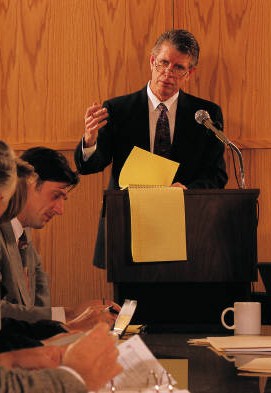In Mr. Smith Goes to Washington, the naïve Mr. Smith yields the Senate floor out of courtesy to a colleague, In doing so he loses his ability to debate on his legislation to prevent graft and corruption, Mr. Smith learned the hard way about the importance of knowing procedural rules. Officers and members of boards and and associations need to know the rules of order to achieve their goals and help their enterprises succeed. Our expertise includes:
- Meeting and Session Governance Services
- Presiding Officer Services
- Delegate Convention or Assembly Services
- Strategic Procedural Planning Services
- Bylaw Drafting, Review, and Revision Services
- Written Opinions Services
- Training Programs
Robert’s Rules of Order, as do other manuals of parliamentary procedure, identifies what I call the one-question principle as a fundamental principle of parliamentary law. The one-question principle is intuitively obvious: in everyday life we typically only address one question at a time particularly in a public discussion such as a classroom or a meeting. In a meeting or deliberative assembly where the primary objective is to make decisions, that is, answer questions, the one-question principle is critical.
A deliberative assembly brings people together to pose questions to the assembly to make decisions as a group. If a deliberative assembly takes up more than one question at a time, confusion quickly sets in. Which question is being discussed? When is one question going to be answered relative to the other. Often times, even when dealing with one question, other questions arise. And it gets worse the more people that are present. That’s why the one-question principle is so important.
When parliamentarians talk about questions, they tend to be very specific. The one-question principle deals the main question or main motion. A main motion is a question that, when answered in the affirmative establishes the will of the assembly. “Should we buy five new computers? Should we contribute funds to a local charity? Should we support a particular piece of legislation?
Each of these questions has the potential to generate significant debate as well spinoff questions related to them. Take the purchase of five computers as an example. How much should we spend, what kind of computers, do we need monitors, keyboards and other peripherals? These questions may be asked, but they have to be related to the main motion and they must be taken up in a particular order. Further, when a related question arises, the one-question principle applies to it in that it must be answered before the underlying question is answered.
Back to the five computers, if some asks that the assembly spend $5,000 on the computers, this must be decided, before the question of whether to buy the computers. This is not just a practical matter of knowing how much is going to be spent. Parliamentary procedure requires this question to be answered, in part because of the one-question principle, but also because of the order of precedence which is discussed in “Which question comes first? Motion ranks and order of precedence.”
You may think that this is a confusing mess. But it’s not really. With the one-question principle combined with other rules such as the order of precedence, an assembly can reach a decision in an orderly and efficient manner.

© 2011-2013 Call to Order Parlimentarian Service
Please! Only one question at a time!


